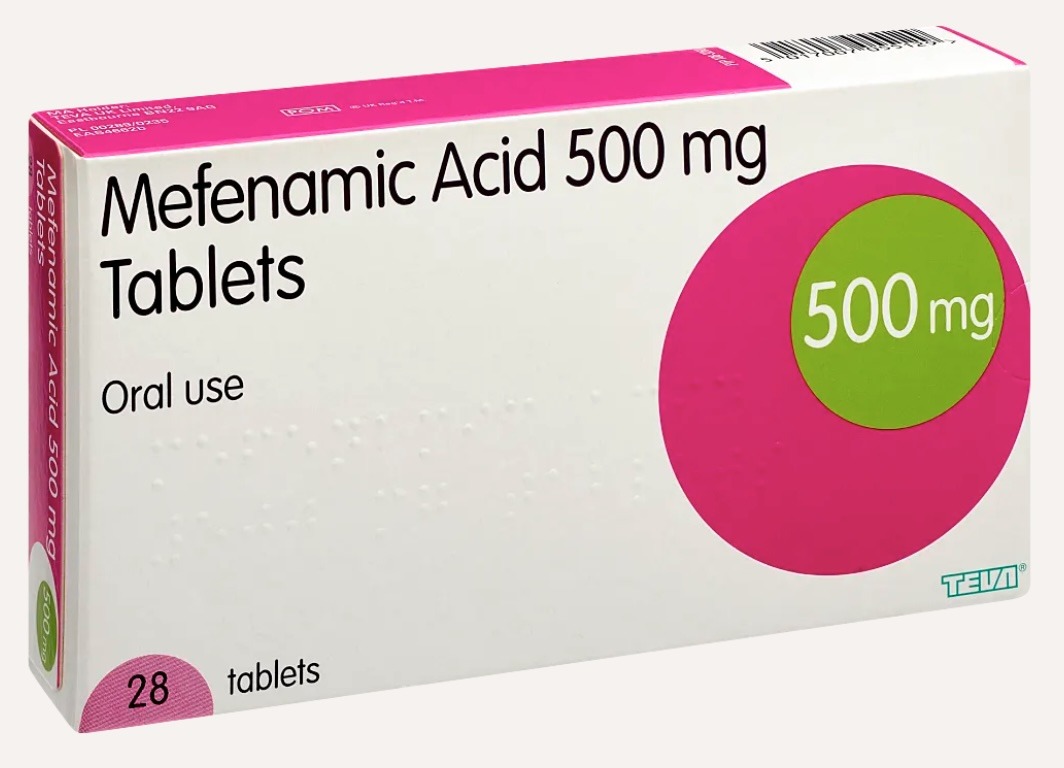Mefenamic Acid 500mg Tablets
Description
Mefenamic Acid 500mg Tablets are a non-steroidal anti-inflammatory drug (NSAID) used to treat mild to moderate pain and inflammation, such as menstrual pain (dysmenorrhea). By reducing inflammation and blocking certain chemicals in the body (prostaglandins), Mefenamic Acid helps alleviate pain and discomfort effectively.
- Effective pain relief: Targets inflammation, making it ideal for period pain.
- Anti-inflammatory action: Reduces swelling and tenderness.
- Fast-acting: Provides quick relief from discomfort.
Warnings
Do not use if you:
- Are allergic to Mefenamic Acid, other NSAIDs (such as aspirin or ibuprofen), or any of the product's ingredients.
- Have a history of stomach ulcers, gastrointestinal bleeding, or inflammatory bowel disease.
- Suffer from severe liver, kidney, or heart problems.
Consult a doctor before use if you:
- Are pregnant, planning to become pregnant, or breastfeeding.
- Have asthma, as NSAIDs may trigger asthma symptoms in some individuals.
- Have high blood pressure, a history of heart disease, or stroke.
Discontinue use and seek medical attention if:
- You experience severe stomach pain, black or bloody stools, or vomiting blood (signs of gastrointestinal bleeding).
- You notice swelling in your hands, feet, or experience shortness of breath.
- You develop a rash, itching, or swelling (signs of an allergic reaction).
Not suitable for long-term use: Mefenamic Acid should be used for short-term pain relief only, as long-term use increases the risk of serious side effects such as stomach ulcers and kidney damage.
Keep out of reach of children: Accidental ingestion can be harmful. Seek immediate medical assistance in case of overdose.
Directions
-
Dosage for adults and children over 12 years old:
The usual dose is 500mg initially, followed by 250mg every 6 hours as needed, with a maximum dose of 1500mg per day. -
Take with food:
To minimize the risk of stomach upset, take Mefenamic Acid with or after food, and swallow the tablets whole with water. -
Do not exceed the recommended dose:
Use the lowest effective dose for the shortest possible duration to minimize the risk of side effects. -
Consult your doctor if symptoms persist:
If pain continues after 7 days of treatment, or if symptoms worsen, consult a healthcare professional. -
Avoid alcohol:
Alcohol may increase the risk of stomach irritation or bleeding while taking Mefenamic Acid.
Ingredients
Active Ingredient:
- Mefenamic Acid (500mg): A non-steroidal anti-inflammatory drug (NSAID) that relieves pain and inflammation.
Inactive Ingredients:
- Microcrystalline cellulose
- Croscarmellose sodium
- Magnesium stearate
- Hydroxypropyl cellulose
These ingredients ensure the proper absorption and stability of the active compound.
Side Effects
Common Side Effects:
- Stomach upset or heartburn: May occur if taken without food.
- Nausea or vomiting: A typical side effect of NSAIDs.
- Diarrhoea: Some users may experience mild digestive disturbances.
Less Common but Serious Side Effects:
- Gastrointestinal bleeding: Signs include black, tarry stools, or vomiting blood.
- Kidney problems: Difficulty urinating, swelling in hands or feet, or unusual fatigue can be signs of kidney damage.
- Allergic reactions: Rash, itching, swelling, or difficulty breathing may indicate an allergic reaction.
Rare Side Effects:
- Stomach ulcers: Prolonged use may increase the risk of developing ulcers.
- Liver damage: Jaundice (yellowing of the skin or eyes) can be a sign of liver issues.
- Severe skin reactions: Blisters, peeling, or a rash could indicate a severe skin reaction.
FAQs
How does Mefenamic Acid work?
Mefenamic Acid works by blocking the production of prostaglandins, chemicals in the body that cause pain and inflammation. This reduces swelling and provides pain relief.
What conditions can Mefenamic Acid treat?
Mefenamic Acid is used to treat a range of conditions, including menstrual pain.
How long can I take Mefenamic Acid for?
Mefenamic Acid is usually prescribed for short-term use (no more than 7 days) to manage acute pain. Long-term use should only be done under the guidance of a doctor due to potential side effects.
Are there any side effects?
Common side effects include stomach upset, nausea, or diarrhoea. More serious side effects, such as stomach ulcers or kidney problems, may occur with long-term use or at high doses.
Can I take Mefenamic Acid with other medications?
You should consult your doctor before taking Mefenamic Acid with other medications, especially other NSAIDs, blood thinners, or medications for heart conditions, as interactions may occur.


